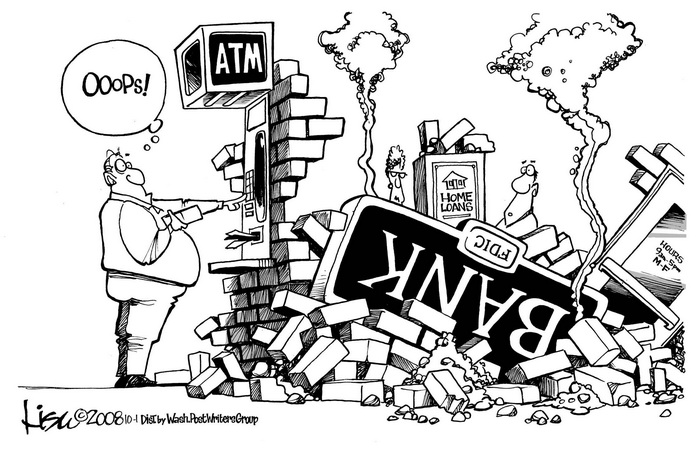
No tears for local banks... A layman’s opinion
Ghana has for the first time been hit very hard by one of the worst financial crisis. Unfortunately, local indigenous banks are at the forefront of this crisis. Today seven of such banks (UT, Capital, The Royal, Sovereign, Construction, Beige and uniBank) have been collapsed by the central bank because they cannot be salvaged under any circumstance.
In the wake of these sad events, many jobs (more than 2,000 and counting) have been lost. What is most unfortunate and frightening about this job losses is the fact that, most of the persons affected are professionals in banking, finance
Why they failed
Many reasons have been assigned for the collapse of the local banks in the country. These include poor corporate governance structures, a reason the central bank has come up with some new rules as to how the banks
But aside that, it has also become evident that most of the owners and shareholders of the banks that have either collapsed or are suffering from panic
For instance, it is on record that there are banks that have ventured into real estate, pharmaceuticals, sports, hospitality
Some of the local universal banks also acquired savings and loans companies and microfinance institutions just to be able to play in that area, aside from their universal banking
Without considering the cost implications, some of them spread themselves so thinly across the country by opening brick and mortar branches under the guise of creating jobs and helping to improve financial inclusion.
Others, for political expediency, over-exposed
It has become like competition so almost every local bank had an insurance company, another sector that
The big questions
There is nothing absolutely wrong with entrepreneurs venturing into other businesses. But there is everything wrong with taking business decisions and risk that do not make any economic sense.
The big question here is that, should it be the business of banks to engage in all these businesses directly without thinking about how to sustainably finance their operations?
What I know about banking is
Why should an owner of a bank take short-term deposits to finance long-term projects directly?
In granting loans to companies, the banks themselves undertake due diligence to ensure that the companies or individuals taking the loans are sound enough to repay the loans.
So what risk assessment did they themselves undertake to ensure that the business areas they were venturing into were right enough, based on their competence?
Why has it become the norm for many business owners in Ghana to venture into multiple sectors, most of which they do not have the competitive urge? Why should a bank use depositor’s funds to finance projects initiated by the government but which have no clear plans of surviving to enable the loans granted to be
“We are an indigenous bank and wholly owned Ghanaian bank”. That's what they say. But the question is, so what?
Call for govt intervention
Today, some of the surviving local banks are struggling and calling for government support in the form of loans to enable
This call is most unfortunate and must be disregarded for simple reasons: First, the liquidity support that most of them received were either mismanaged, misapplied, misappropriated or stolen and this has become the burden of the taxpayer. Why on earth should the government, which is unable to find funds to even patch the numerous potholes on our streets, give loans to owners of banks with questionable business mindsets?
I have also heard some former bankers asking the public not to abandon the local banks because even when they go down, their deposits will be safe because the government will intervene. This assumption is most unfortunate and cannot be supported by any logic because then it gives room for every Tom, Dick
It is not lost on us that the mess and greed of a few banks have caused the nation about GHȻ13 billion and counting, and now we still want more in the form of loans? That call can only be a joke.
Way forward
At a time when the government is struggling to meet its revenue targets; at a time when the government is finding it hard to finance its laudable flagship projects and also undertake major development projects across the country, it should be careful who it listens to.
We can no longer allow the funds of well-meaning Ghanaians to be used to finance the misdeeds of a few who think about themselves under the guise of creating jobs yet are ripping the nation off.
Again, that proposal by the central bank to the Ministry of Finance to support the collapsing microfinance institutions and savings and loans companies which have been mismanaged and are now in debt should also be disregarded.
We need the government to use taxpayers’ funds wisely so that the efforts of the Ghana Revenue Authority to raise more funds through its intensified campaigns will not go waste.
Painful as it may be, it is better for the local banks to go down so that their owners will learn lessons. Supporting them will rather make them more reckless and there is evidence to show.
I expect the central bank to sit up and crack the whip without fear or
I urge all to ensure that we do not do business with banks, whether local or foreign, whose managers have questionable characters. We should not allow ourselves to be baited with unrealistic interest rates as quoted by some, mostly local banks. By that, we can weed the charlatans out and have a prosperous Ghana.
If the so-called foreign banks are making it, then it means they are doing something right. That is why I cannot cry for the local banks because they are doing everything wrong.
If I have any tears, I will cry for the many professionals who are sitting at home because some characters called entrepreneurs ended up being '
I am a citizen.
